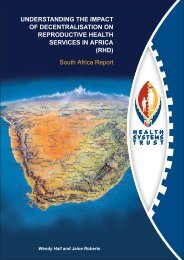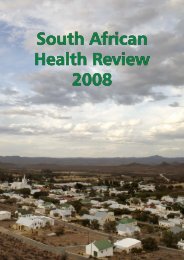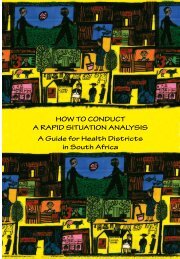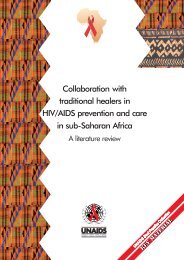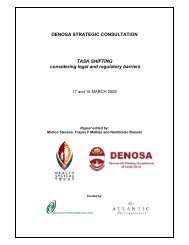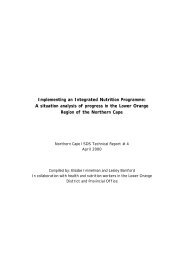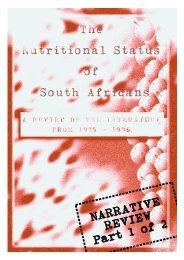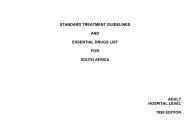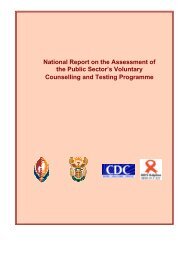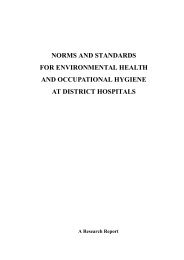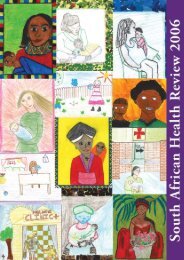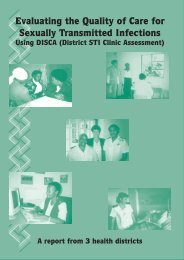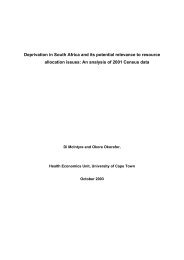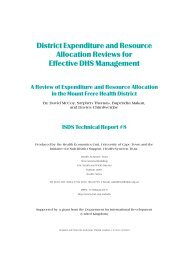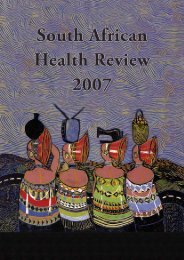PMTCT, and National's - Health Systems Trust
PMTCT, and National's - Health Systems Trust
PMTCT, and National's - Health Systems Trust
Create successful ePaper yourself
Turn your PDF publications into a flip-book with our unique Google optimized e-Paper software.
Differences in provincial policies<br />
In the absence of a national policy on HIV <strong>and</strong> infant feeding for the non-pilot sites, provinces<br />
have developed their own policies based on their experiences with the pilot sites. As a result<br />
there are various infant feeding policies being implemented across the country. In the Free<br />
State <strong>and</strong> Northern Cape the decision was made not to supply free formula outside of the<br />
pilot sites. The Free State made this decision based on findings from the pilot sites that despite<br />
the availability of free formula milk, women still mix feed with breastmilk <strong>and</strong> formula milk.<br />
It is interesting to note that the MCWH directorates <strong>and</strong> not the HIV directorates in these two<br />
provinces manage the <strong>PMTCT</strong> programme. The Free State has the highest rate of breastfeeding<br />
intention amongst HIV positive women in the pilot sites. This is most likely attributable to the<br />
influence of the MCWH management <strong>and</strong> their commitment to lactation management training<br />
<strong>and</strong> the Baby Friendly Hospital Initiative. The Free State plans to phase out the free formula<br />
from the pilot sites as soon as they receive notification that the pilot sites have ended their<br />
term.<br />
The other seven provinces are supplying free formula to non-pilot sites, however, there are<br />
reports from many sites of poor stock control <strong>and</strong> procurement <strong>and</strong>, in Mpumalanga, of<br />
formula only being available at clinics <strong>and</strong> not hospitals. On discharge, mothers are informed<br />
that they can collect formula from their nearest clinic.<br />
Provinces will continue to develop their own policies in the absence of national guidance which<br />
may be detrimental to infant nutritional safety <strong>and</strong> cause confusion amongst health workers.<br />
DISCUSSION<br />
Concerns about spillover<br />
There have been concerns that the promotion of formula feeding in HIV positive women could<br />
‘spill over’ into the general population 4 . ‘Spillover’ is considered to be increased use of formula,<br />
either earlier introduction, increased use of formula feeds or stopping breastfeeding altogether<br />
in HIV uninfected populations, or populations of unknown HIV status.<br />
Data from Botswana 4 suggests that the provision of free formula by facilities could be perceived<br />
by the general population as an official endorsement of formula feeding as being superior<br />
to breastfeeding. Together with the low levels of knowledge about the value <strong>and</strong> benefits of<br />
exclusive breastfeeding amongst health workers, <strong>and</strong> with the added confusion related to HIV<br />
transmission, the policy could lead to an undermining of breastfeeding promotion <strong>and</strong> a<br />
deterioration of child health outcomes. These concerns have been given further justification<br />
by a UNICEF study of four countries in Southern Africa reporting that uncertainty over HIV<br />
<strong>and</strong> infant feeding was leading to a dangerous demise in support for breastfeeding 5 .<br />
The study in Botswana found that 95% of the women (unknown HIV status) at non-<strong>PMTCT</strong> sites<br />
were breastfeeding, while only 76% of HIV uninfected women at <strong>PMTCT</strong> sites were breastfeeding.<br />
The research concluded that the decrease in breastfeeding amongst uninfected women at<br />
<strong>PMTCT</strong> sites was due to the availability <strong>and</strong> distribution of free infant formula, which indirectly<br />
promotes infant formula as being a good form of feeding.<br />
There is also evidence that the provision of commercial infant formula increases the potential<br />
for, but does not guarantee, exclusive formula feeding. Data from Nairobi, showed that at<br />
least 30% of HIV-infected women who chose to formula feed <strong>and</strong> who were provided with<br />
subsidised formula milk, did not exclusively formula feed 6 . It is possible that when infant<br />
formula is offered free of charge, clients might be tempted to choose formula feeding because<br />
this option would increase the food security of the household <strong>and</strong> not because they are<br />
committed to exclusive formula feeding. Hence the provision of free infant formula might<br />
increase the likelihood of mixed feeding which is thought to be particularly dangerous.<br />
42



